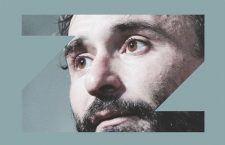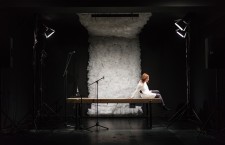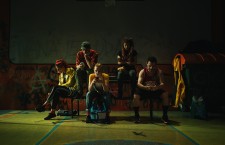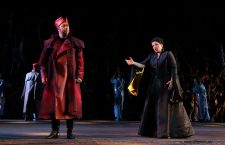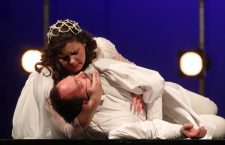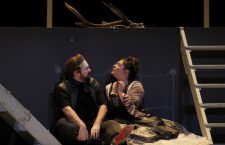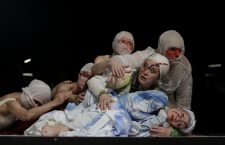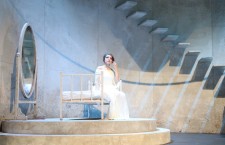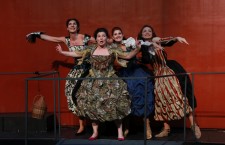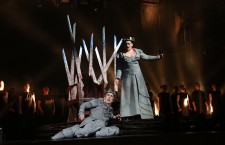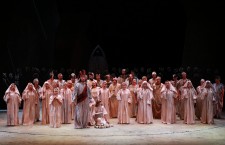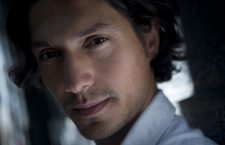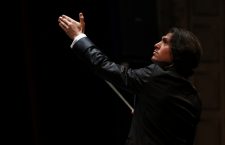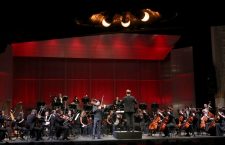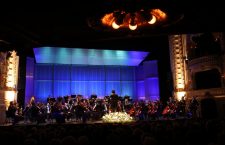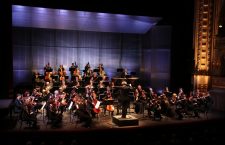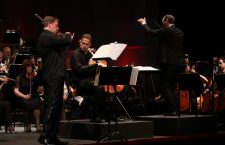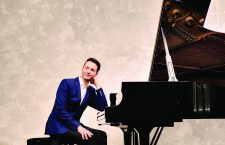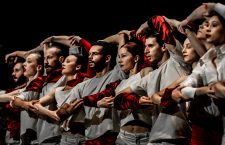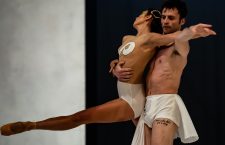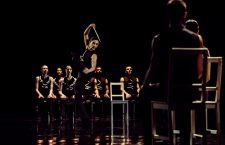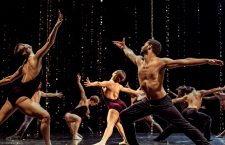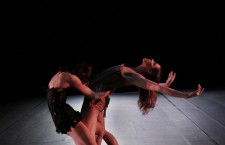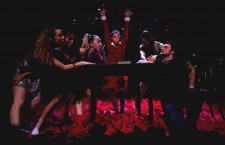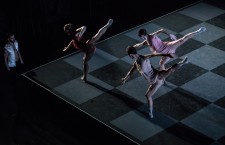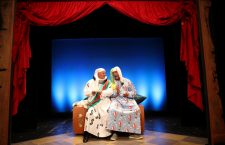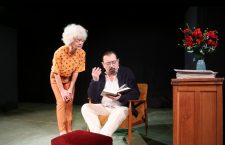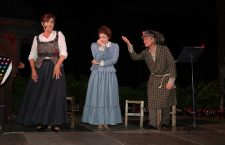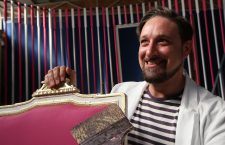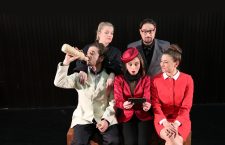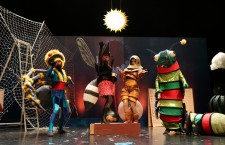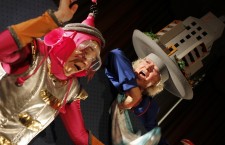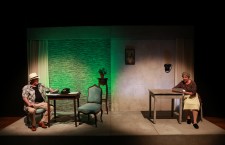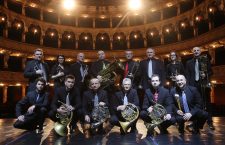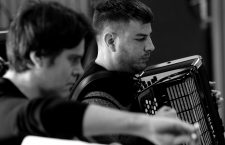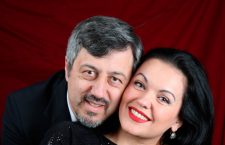PRACTICING DIVERSITY
The new season – 18/19 is the last one preceding the beginning of the programme Rijeka – European Capital of Culture. The Rijeka CNT, the second biggest production establishment for performing arts in Croatia, will be playing one of the key roles in that programme. Thus, with the new season 18/19, we are inviting our spectators to get ready and set. The contents and the slogan – PRACTICING DIVERSITY – are echoes of the idea of Rijeka as a European Capital of Culture, also the Rijeka CNT as a theatre institution that in the last years has shown how to build, expressed what it means and proved that it can and should be the breakwater to our, Rijeka and European, PORT OF DIVERSITY.
The Rijeka CNT, our Zajc, is not just a theatre you come to in order to see and confirm what you already know, but also the theatre into which we invite you to examine, discover, learn, experience and practice – that from life which eludes everyday, passing and superficial experience. This does not mean that we will not entertain you, make you laugh and feel relaxed. On the contrary! What it means, and by no means “just” so, is that the Rijeka CNT does not give up on being an artistic theatre, and it is in this risk that it sees its obligation, responsibility and the only possible future.
Become or remain the visitor of Zajc, come to the Rijeka CNT – practice with us our and your diversity, practice the art of watching, practice – life!
19 premiere titles, 19 reruns, 20 concert performances, 13 guest performances of drama, ballet and music ensembles; Krleža, Daša Drndić, Dario Fo, Ivana Brlić Mažuranić, Ivan pl. Zajc, Gounod, Mozart, Richard Strauss, Verdi, Shakespeare, Tchaikovsky, Bruckner, Stravinsky, Brahms, Bartók, Chopin, Saint-Saëns, Ravel, Leonard Bernstein, Andrew Lloyd Webber; comedies and tragedies, musicals and and operettas, symphonies and serenades, dance and ballet, operas and required readings, drama and post-drama theatre, performances for all generations of spectators – that is Zajc, the THEATRE OF DIVERSITY, in the new season. Better than this only in 2020.
So – get ready!
Marin Blažević, General manager and Artistic Director
GETTING ALONG WITH
People rarely hug here when meeting in the street, rarely squeeze each other wholeheartedly. Why hug when they see each other all the time. Nothing new happens for months and for years. Someone dies now and then, someone is born, moves in, while only those who can or have to move out. I don’t know whether it means that no one misses anyone here, that people here suffer from the lack of yearning, I have no idea, perhaps there are those who yearn for someone or something, there are probably such people too, it would be totally insane if there were not such a person.
Daša Drndić
A few months ago, The Croatian Drama ensemble met Anne Bogart, one of the greatest American directors. During our meeting, Anne pronounced a sentence, namely, a definition of theatrical art that all of us, both artists and spectators can use as a reminder of why we create and consume theatre: The theatre is about how we get along with each other.
The 2018/2019 season introduces us to the programme of the European Capital of Culture, the outcome of which depends on the way we will be getting along with each other and how, based on that, we will uphold what we believe the subject matter of public interest to be. Clearly, this is not only the issue regarding the European Capital of Culture project, but also a much larger problem of social polarisation that is growing on the economic abyss. Thus the role of the Croatian Drama 2018/19 season will be an attempt to understand better our emotional and intellectual cooperation; reasons due to which we feel we belong or do not so to a community, the ability to improve it, break or leave it.
The first title of the season is Michelangelo, after the play by Krleža and in the direction of the Slovenian director Sebastijan Horvat, who, three years ago, by his staging of the Croatian Rhapsody prompted a dynamic debate on how we communicate with Krleža’s works nowadays, a staging so dynamic that its name had to be changed into On the Grave of Stupid Europe / Nad grobom glupe Europe. The interest of Horvat for the idea of a genius or a kind of a Nietzsche’s superhuman being (Ubermensch) is this time directed to the power of artistic creation that is becoming dissolved in the contact with the everyday social and political picture.
Regoč by Ivana Brlić Mažuranić, in the direction of Olja Lozica, was chosen as the second premiere of the season as we wish to show that those willing to give a helping hand to each other deserve the best of the world, while vanity and envy make bridges collapse, flood people, villages, towns and civilisations. Regoč and Kosjenka, Ljiljo, Old man and Old woman are torchbearers of our youngest visitors – one day adult neighbours and fellow citizens.
Leica format by Daša Drndić, the third premiere in this season, is the most painful one with regard to our local context. Not only because Daša has not been with us since recently, but also because Leica format is pulling out the roots of the badly healed wounds of our past and present; the past of poorhouses, orphanages, psychiatric institutions, fascism and the unusual identity of the city that according to her “is rotting silently and invisibly, from the inside”. Leica format will be our opportunity for dismantling the local patriotism, as well as a challenge for the European Capital of Culture slogan Port of Diversity.
The Croatian Drama premieres also comprise joint productions of artistic branches as the Theatre Enchantment / Kazališna čarolija and Sunset Boulevard / Bulevar Sumraka.
In short, it is beyond doubt that in the 2018/19 season we are going to find out how we are getting along with each other.
Renata Carola Gatica, Croatian Drama director
and
Nataša Antulov, Croatian Drama dramaturge
Dear opera lovers,
There is another opera season ahead of us, full of surprises and exciting titles. Diversity as an underlying theme will also be reflected in the Opera. Thus, four premiere titles will be performed in four different languages, each opera premiere bearing a different stylistic expression.
We are beginning the season with the most famous Croatian opera Nikola Šubić Zrinski by Ivan pl. Zajc, with new staging and after more than twenty years. Dora Ruždjak Poldolski’s sensibilities, inventiveness and confidence can guarantee that the new Zrinski will be the opera to be performed for years on the stage of the Rijeka Opera. The premiere and first performances will be conducted by Ville Matvejeff, our principal guest conductor. It is definitely a rarity, if not unprecedented, for a Zajc opera to be under the baton of a conductor whose origins are not Slavic. Giorgio Surian, our principal soloist, is performing as Zrinski in the premiere cast, while Kristina Kolar, also our principal soloist, is in the role of his wife Eve. Anamarija Knego and Aljaž Farasin are in the roles of the couple in love, Jelena and Juranic.
We have another French title on stage in January. Following the success of Werther, we are bringing the timeless love story of Romeo and Juliet in one of the best known opera versions, namely, that of Gounod. We are staging this great project in the coproduction with Fondazione Ravenna Manifestazioni. There will be even two casts with a great number of international names. In leading roles there will be Rijeka stars Anamarija Knego and Aljaž Farasin. In the dramaturgy-direction of Marin Blažević and under the baton of Paolo Olmi, Romeo and Juliet is also an ideal title for all lovers of Shakespeare who still have to fall in love with opera. It is easy with Gounod, immensely beautiful melodies follow the whole opera, be it in love, fighting or tragic scenes.
Laughter always follows tears. Thus, in March we will be able to relax and laugh at the comic plot and a number of unexpected dramatic turns in The Marriage of Figaro, one of the most frequently performed Mozart operas. Under the baton of the proven Maestro Stefano Rabaglia and in the direction of Ewa Buchmann, the cast will feature a great number of our soloists, as Anamarija Knego, Robert Kolar, Dario Bercich, Ivana Srbljan, Slavko Sekulić and others. This performance is in the co-production with the Piccolo Festival del Friuli Venezia Giulia from Italy and the Amsterdam studio Punto Arte.
The great finale and crown of the opera season will definitely be Elektra by Strauss. This work is a great challenge for every opera house. In our case this challenge also means a bit of madness! It is only the second opera by Strauss, after Der Rosenkavalier, to be performed in Rijeka. This opera, a culmination of expressionism and modernism in the opus by Richard Strauss, provokes astonishment still nowadays, fascinating also with the complexity of the score that with its power and directness follows the libretto up to the minutest detail and relations among protagonists. Electra is one of the most difficult roles ever composed for a dramatic soprano, in Rijeka to be sung by Maida Hundeling. Dubravka Šeparović is coming back to the Rijeka Opera stage in the role of Electra’s mother Clytemnestre, Giorgio Surian, continuing his incredible sequence of artistic challenges, as Electra’s brother Orestes. In co-operation with the Slovenian Philharmonic, the orchestra will have more than100 musicians playing under the baton of Maestro Ville Matvejeff.
Petar Kovačić, Opera director
Dear music lovers,
The concert season ahead of us with its varied programme and a wide range of guests from all over the world will render our symphonic evenings a proper stage of diversity.
The most significant piece of news that will mark not only this season but also the ones that follow is the inauguration of our new chief conductor Yordan Kamdzhalov. Besides the great concert on the occasion of opening the season with the grandiose Bruckner’s Symphony No. 7, we will also be able to listen to him at the All Saints’ Day concert performing Verdi’s Requiem with our soloists Kristina Kolar, Ivana Srbljan, Aljaž Farasin and Slavko Sekulić. Do not miss the the splendid New Year’s Concerts either, to be taking you on the journey around Europe. We are ending the concert season in June with the romantic Rachmaninoff and the pianist star Michail Lifits, as well as the Symphony No. 5 by Piotr Ilyich Tchaikovsky.
Among other concerts we are pointing out two of them to be conducted by our principal guest conductor Ville Matvejeff. With the first, in October, we will be marking the hundredth anniversary of birth of the famous American conductor and composer Leonard Bernstein, with the violinist Dan Zhu. At the same concert, it is the first time that we will be able to listen to one of the most significant compositions of the 20th century, that is, Concerto for Orchestra by Bartók. There is the Finnish Evening in May with Jukka Merjanen and Tuomas Ylinen in Double Concerto by Brahms and the Symphony No. 5 by Sibelius. At the beginning of the concert you will be able to become acquainted with Ville Matvejeff also as a composer as we are performing his most successful work Ad Astra!
Korean conductor TaeJung Lee will be our guest again in January. Besides the Horn Concerto No.1 by Richard Strauss with the magnificent Boštjan Lipovšek as a soloist and Symphony No. 5 by Mendelssohn, this concert will also be marked by a first performance; namely, young Italian composer Daniel Espen has written specially for our orchestra the work The Eternal Return. By this order of a new piece we are continuing with the enrichment of musical heritage, at the same time also encouraging young authors.
What we have in March is one of the highlights of the concert season with two special artists. Following the last season’s enthusiasm of of the audience, Philipp von Steinaecker is back, this time with Symphony No. 2 by Brahms and with the Italian pianist Federico Colli as the soloist of the evening. Colli is the winner of the prestigious competition in Leeds and one of the most interesting artists of his generation.
This year as well, we have prepared a varied programme for lovers of chamber music. Double bass soloist of our orchestra Petrush Petrushevski will present himself with Renata Hil on the piano in a diverse programme presenting double bass as a soloist instrument. One of the more interesting chamber concerts will be the one to host the Acoustic Project. The joining of tradition and future, classical and ethno in exciting arrangements will prompt you to reconsider musical canons. Brass & Percussion is a project by Opera Orchestra musicians taking you into the world of film; forget the 4D, the real excitements are waiting for you at the Theatre!
At the Easter Concert, for the first time in Rijeka, we will be able to hear the work of one of the most significant composers of the 20th century, The Seven Last Words of Christ for cello, bayan and strings by Sofia Gubaidulina, being one of her most famous compositions. At the end of our chamber season, our soloists Kristina and Robert Kolar will present themselves as a harmonious duo on the Theatre stage.
A dream concert season!
Petar Kovačić, Opera director
Dancing of Diversity
Following the successful last year’s season characterised by a variety that brought us a number of changes and new decisions, the forthcoming season of the Rijeka Theatre Ballet continues to be guided by the idea of diversity. Even more determined and confident of the diversity of work, artistic styles and ballet genres, by our dancing of diversity we would like to strengthen, develop and consolidate the position and activity of the Rijeka Ballet Ensemble.
Having chosen different artistic projects, we re bringing a number of co-operative projects in the coming season. We are beginning the ballet season with the premiere of 4 Boleros with four choreographic handwritings, then Serenade & Allegro as a product of a fruitful co-operation of the Rijeka and Split theatres, in the spring, as part of the 30th Music Biennale Zagreb, presenting the music-ballet co-operation to bear the fruit of the Hero is Tired/ Heroj je umoran performance, while at the very end of the season the performance Pulcinella, Apollo will be presenting two neoclassical handwritings of young European choreographers to the music of Igor Stravinsky. It is in the encounter with the other and the different that we can try out and test the flexibility of the Ballet Ensemble ready for creation, innovation and, eventually, for the ensemble artistic identity and attitude. Led by the idea of culture that is accessible to all and with a variety of our programme, we would like to encourage the development of knowledge, acquaintance with different artistic sensibilities, but also the development of a greater appetite with the already existing audience, namely, in this way to attract the new one as well.
The evening of 4 Boleros that we could also call the evening of diversity, is presenting four compositions inspired by the bolero music and dance form. Four different pieces, that is, four different boleros that vary from the Chopin romantic one to the contemporary Laboš electronic style, are starting points of choreographic investigations of the invited choreographers and the Rijeka ballet ensemble.
Marking the 100th anniversary of Leonard Bernstein’s birth, Rijeka wishes to honour the inspirational musician and charismatic man by two new choreographies of Maša Kolar and Igor Kirov. The 100th anniversary is a special occasion for the two national theatres to cooperate, that from Rijeka and Split, and for both ballet ensembles to work together.
In the spring of 2019, the CNT Ivan pl. Zajc Ballet will have the opportunity to take part of the 30th Music Biennale Zagreb that has invited two recent artists, composer Frano Đurović from Croatia and choreographer Guiseppe Spota from Italy, with the idea to encourage dialogue among artists of different cultures, also to promote artistic diversities.
Eventually, after a long time, the Ballet ensemble dances again to the music performed by the Rijeka Opera Orchestra. The occasion for this are two neoclassical works by Igor Stravinsky, Pulcinella and Apollo, as well as two European choreographers of the new generation of neoclassical ballet, Giovanni di Palma and Martin Chaix. The Pulcinella ballet had its revived premiere in 2017 in São Paulo, 100 years after it had been first premiered by the famous ballet ensemble Ballets Russes. Having delighted the critics and the audience throughout South America and Europe, this performance presents the opportunity for the Rijeka Ballet ensemble to show and prove their readiness to follow the biggest world challenges of the contemporary ballet art.
It is within the Koreo-lab project that members of the Rijeka Ballet will be able to find and express their own artistic language, showing the Rijeka audience through performing nights what the direction of their development is. On the other hand, the KamovDANCE/ KamovPLES workshops enable children and the young to become acquainted with the activities of our ensemble by ballet pedagogues who will be teaching them new dance steps, which, hopefully, will take them further into the world of dance and ballet. Engaging in ballet, but also other artistic programmes of the national theatre, through professional workshops and teaching programmes, the ensemble is able to reach the level of excellence, i.e., raise the standard of forming artistic programme by inviting distinguished key Croatian and world artists. This means being able to recognise new, innovative and creative artists, also the readiness and wish to work to the highest artistic standards
Maša Kolar, Ballet Company director
NOTHING IS AT IT SEEMS
Nothing is as it seems, the reality often being deceptive: in fauna, animals of gentle appearance often hide a fierce brutality; among flora, flowers of intoxicating smell hide deadly poisons; in the human world, kind smiles can hide cruel intentions, while a cold reproaching look silent love.
A theatre is the mirror of the world, in it everyone can see a reflection of her or his own life, wishes and yearnings. But, the mirror is an artefact, unnatural formation invented to show something similar to the lens that enlarges only small, to the eye invisible details, something that slows down scenes that unfold too fast in a real life or that which ironically distorts contours that become too long or too wide.
It is the difference between what is and what is shown, between the appearance and the content, between body and soul that is the theme of this rich season. Different authors, different genres, standards and dialects, laughter and tears, this is the repertoire that we are offering this year, rich as a royal feast at which our actors are serving. Let us serve one dish after the other; taste with us the pleasure of the theatre, culture being the food of the spirit.
Giulio Settimo, Italian Drama director
Dear music lovers,
The concert season ahead of us with its varied programme and a wide range of guests from all over the world will render our symphonic evenings a proper stage of diversity.
The most significant piece of news that will mark not only this season but also the ones that follow is the inauguration of our new chief conductor Yordan Kamdzhalov. Besides the great concert on the occasion of opening the season with the grandiose Bruckner’s Symphony No. 7, we will also be able to listen to him at the All Saints’ Day concert performing Verdi’s Requiem with our soloists Kristina Kolar, Ivana Srbljan, Aljaž Farasin and Slavko Sekulić. Do not miss the the splendid New Year’s Concerts either, to be taking you on the journey around Europe. We are ending the concert season in June with the romantic Rachmaninoff and the pianist star Michail Lifits, as well as the Symphony No. 5 by Piotr Ilyich Tchaikovsky.
Among other concerts we are pointing out two of them to be conducted by our principal guest conductor Ville Matvejeff. With the first, in October, we will be marking the hundredth anniversary of birth of the famous American conductor and composer Leonard Bernstein, with the violinist Dan Zhu. At the same concert, it is the first time that we will be able to listen to one of the most significant compositions of the 20th century, that is, Concerto for Orchestra by Bartók. There is the Finnish Evening in May with Jukka Merjanen and Tuomas Ylinen in Double Concerto by Brahms and the Symphony No. 5 by Sibelius. At the beginning of the concert you will be able to become acquainted with Ville Matvejeff also as a composer as we are performing his most successful work Ad Astra!
Korean conductor TaeJung Lee will be our guest again in January. Besides the Horn Concerto No.1 by Richard Strauss with the magnificent Boštjan Lipovšek as a soloist and Symphony No. 5 by Mendelssohn, this concert will also be marked by a first performance; namely, young Italian composer Daniel Espen has written specially for our orchestra the work The Eternal Return. By this order of a new piece we are continuing with the enrichment of musical heritage, at the same time also encouraging young authors.
What we have in March is one of the highlights of the concert season with two special artists. Following the last season’s enthusiasm of of the audience, Philipp von Steinaecker is back, this time with Symphony No. 2 by Brahms and with the Italian pianist Federico Colli as the soloist of the evening. Colli is the winner of the prestigious competition in Leeds and one of the most interesting artists of his generation.
This year as well, we have prepared a varied programme for lovers of chamber music. Double bass soloist of our orchestra Petrush Petrushevski will present himself with Renata Hil on the piano in a diverse programme presenting double bass as a soloist instrument. One of the more interesting chamber concerts will be the one to host the Acoustic Project. The joining of tradition and future, classical and ethno in exciting arrangements will prompt you to reconsider musical canons. Brass & Percussion is a project by Opera Orchestra musicians taking you into the world of film; forget the 4D, the real excitements are waiting for you at the Theatre!
At the Easter Concert, for the first time in Rijeka, we will be able to hear the work of one of the most significant composers of the 20th century, The Seven Last Words of Christ for cello, bayan and strings by Sofia Gubaidulina, being one of her most famous compositions. At the end of our chamber season, our soloists Kristina and Robert Kolar will present themselves as a harmonious duo on the Theatre stage.
A dream concert season!
Petar Kovačić, Opera director

